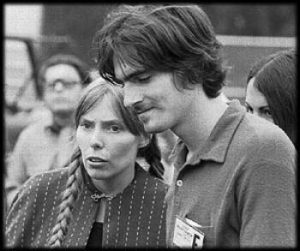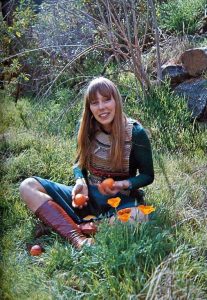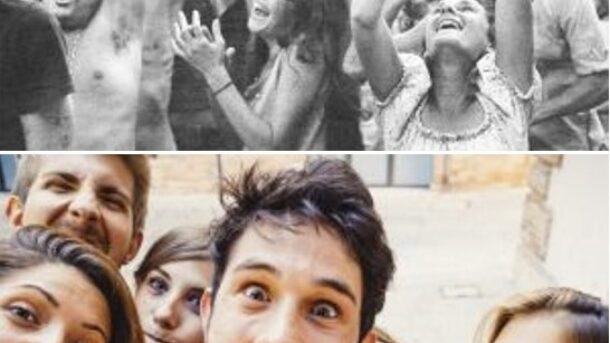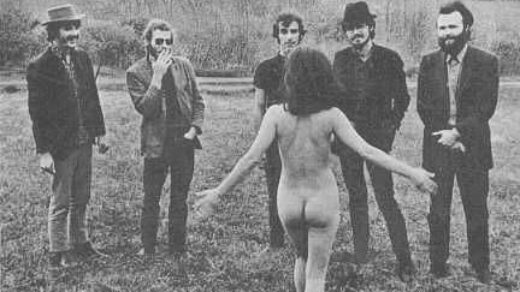Joni Mitchell isn’t relevant for the 21st century. It’s a shame, I cry over it, but it’s true.
She evoked immense admiration for her precision craftsmanship and gushy affection for her emotional stripteases among her peers, the era whose epithet she helped coin—The Woodstock Generation. And of course she’s spawned several generations of introspective singer-songwriters, strong younger women building on the ground Joni broke. All of them credit Joni as their soul-mother.
But she was of a different generation, and no matter how much the young ‘uns may pantheon her, I don’t believe they have an inkling of the world of which she speaks.
Let me take one song, try to explain why it was so relevant and meaningful back then, and then why I think it’s so irrelevant to the 21st century: ‘Electricity’, a fine, overshadowed song on a fine, overshadowed album, “For the Roses” (1972), wedged between the masterpiece of intimacy (“Blue”) and the large-canvas grandeur of the orchestral (“Court and Spark”).
 The song employs an extended metaphor of love as electricity, the two lovers grappling with the throes of shorts and frayed wires, Joni at her most literary. She protests relating to her songs as mini-romans a clef, but that’s disingenuous. She must enjoy sprinkling her songs with all those intriguing, intimate details such as James Taylor’s suspenders in the preceding song, ‘See You Sometime’. It’s a signature device–deny it as she may, we all revel in Joni’s juicy (or even gooey) autobiographical details, the catalog of her paramours.
The song employs an extended metaphor of love as electricity, the two lovers grappling with the throes of shorts and frayed wires, Joni at her most literary. She protests relating to her songs as mini-romans a clef, but that’s disingenuous. She must enjoy sprinkling her songs with all those intriguing, intimate details such as James Taylor’s suspenders in the preceding song, ‘See You Sometime’. It’s a signature device–deny it as she may, we all revel in Joni’s juicy (or even gooey) autobiographical details, the catalog of her paramours.
To explicate ‘Electricity’ in the broadest of strokes, there’s a couple dealing with an electricity problem/outage which symbolizes their relationship. It’s all a mess (“She’s got all the wrong fuses and splices”; ”The masking tape tangles, It’s sticky and black”), and neither they together nor she alone can “fix it up too easy”. It’s a real, undeniable problem–the circuit just keeps shorting.
There are two difficulties in parsing the song. First, the chronology is chopped up. To put it in order (but you know this already; we’ve all experienced the same arc in a transitory relationship):
1. We were in love. (we floodlit that time)
2. He sang her soothing songs that (still) run through her circuits like a heartbeat
 3. He moved to a different place (with a good dog and some trees, but his heart over-icing) where she doesn’t fit (She don’t know the system, she don’t understand)
3. He moved to a different place (with a good dog and some trees, but his heart over-icing) where she doesn’t fit (She don’t know the system, she don’t understand)
4. The relationship short-circuits (The lines overloaded, sparks flew, wires lashed out.)
5. She holds a flashlight for him, to fix the fusebox/relationship.
6. She even holds a (non-electric) candle for him, begging him to fix things.
7. She’s left with love (heartbeat) unfixed (heartbroken).
 The ending is the Joni we all know and love: No rancor, elle ne regrette rien. She begs him to show her how to fix it, but he won’t. He just leaves her with his song coursing through her bloodstream. There are those who’d say it’s an allegory for James having gone and married Carly, but she got a good album out of it. Just stoking the star maker machinery,
The ending is the Joni we all know and love: No rancor, elle ne regrette rien. She begs him to show her how to fix it, but he won’t. He just leaves her with his song coursing through her bloodstream. There are those who’d say it’s an allegory for James having gone and married Carly, but she got a good album out of it. Just stoking the star maker machinery,
Joni is canonized today as a harbinger of a new perception of the female of the species, and justifiably so. I know lots of young musicians of the female persuasion who place Joni’s bust on the mantle of their heroes and heroins, right alongside Jim, Jimi, and Janis.
 Worshiping those gods of My Generation has become a ritual. Praising J, J and J has become a knee-jerk genuflection. I admit that I sometimes take advantage of that superstition. More than once in conversation with a Millenial have I name-dropped kissing Janis or hurting Joni’s feelings in order to garner Street Cred.
Worshiping those gods of My Generation has become a ritual. Praising J, J and J has become a knee-jerk genuflection. I admit that I sometimes take advantage of that superstition. More than once in conversation with a Millenial have I name-dropped kissing Janis or hurting Joni’s feelings in order to garner Street Cred.
I do it more and more frequently as I despair of creating any meaningful dialog with these kids. I simply flash my “I was at Woodstock” badge, or just shove into the conversation “I saw the Beatles perform” and watch their jaws drop. It works for a while, but I know they’re worshipping false gods. The Paul McCartney touring today isn’t the Paul of ‘Penny Lane’. Bob Dylan singing ‘That Old Feeling’ or ‘As Time Goes By’ (better them than ‘The Best is Yet to Come’) is not Bob Dylan singing ‘The Times They Are A-Changing’, or even ‘Forever Young’.
Remember the Y2K bug? (I know, it was 22 years ago, so how could anyone under 35 be expected to remember it? Well, I remember it well. I took it half seriously—that at the stroke of midnight on December 31, 1999, the world would collapse. Not just the computers of the world–the world itself. The sun would extinguish. The earth would stop spinning. FACEBOOK WOULD COLLAPSE IRRETRIEVABLY! (Launched in 2004, I know, but still.)
But it passed, and nothing seemed to happen, so everyone thought Doomsday was a marketing ploy.
It wasn’t. The Y2K bug passed. But unbeknownst to all, the seeds of the Millennium Plague had been planted. It was the night when humanity as we know it was infected by cannibal electrons.
I always preferred young people to those my age. They were vital, creative, excited and exciting. You could well attribute it to arrested development. I preferred to think of it as fuel for my creative bent.
I’ve worked with young people all my life. In my 20s and 30s and 40s, as a teacher and playwright, I surrounded myself with teenagers, They invigorated me. I actually learned to speak their language (teenagerese), and wrote successful plays in it. In my 50s and 60s I worked in hi-tech. When I started, my colleagues were in their late 20s; despite all the rumors about ageism, we got along just fine.
At social gatherings over all these decades, I’d look for an excuse to sit at the young peoples’ table. The girls were prettier, they guys were handsomer, and there was a lot more laughter going on.
But recently it’s fallen to my lot to be involved with Generation Y or Z or whatever, those who spent their formative years staring at screens, those who got their first iPhone before their first kiss. I tell you authoritatively: these creatures are post-Woodstockian zombies.
They engage nothing. You could get dirty. Word of the Century: “Whatever”.
They commit to nothing. They are way too cool for that. Jobs, bands, relationships.
They feel nothing. Emotions are so passé. Give them shots and apps.
They won’t even talk. There’s a 40-year old colleague who shows sparks of caring, with whom I’m trying hard to cultivate a creative relationship. I recently texted him, all fired up, “I got this really cool idea, when can we talk?”, to which he responded in all his Millenial phlegmatism “I don’t have time to talk. Text me.”
 Of course I didn’t bother to respond. I’m learning. Slowly and painfully. I may not be ready to give up my belief in communication and caring, but at least I’ve begun to figure out that it’s a gene they lack. I’m even starting to sit at the grownups’ table.
Of course I didn’t bother to respond. I’m learning. Slowly and painfully. I may not be ready to give up my belief in communication and caring, but at least I’ve begun to figure out that it’s a gene they lack. I’m even starting to sit at the grownups’ table.
They no more believe in pain and love and human intercourse than they do in the need to know how to do long division by hand or to remember telephone numbers by heart.
What do they believe? They believe fervently that Bill Gates created the world in six days. They believe that Wonder Woman is a profoundly true representation of a new social reality. They believe that there is no distinction between Facebook and the real world.
 These kids, they don’t know from fuse boxes any more than they know of the human heart. Electricity ain’t no thang, as long as the iPhone is charged. But they even have external energy packs for that.
These kids, they don’t know from fuse boxes any more than they know of the human heart. Electricity ain’t no thang, as long as the iPhone is charged. But they even have external energy packs for that.
We denizens of the 20th century know why we can’t hear as well over a cell phone as we can over a landline. It’s because the bits and bytes are compressed, and the frequencies cut off at the knees and at the shoulders. You get only the bare binary data necessary to process the speech. We also know that our hearing isn’t what it once was.
What the Millenials don’t realize is how much of their humanity is lost in the restrictions of that digital compression. Emojis replace emotions. Write nothing other than the obvious and the factual in your text messages, because ‘everyone knows there’s no nuance in email’. Well, you can always add a smiley.
These Generation Whatever kids, they may idolize Joni, but they will never begin to really get her. You and I know that. Joni is the one who created for us a world of passion and pain, of knowing that you’re going to get burned but throwing yourself into a doomed relationship. Feeling and caring, no matter what the cost.
Joni knows she will not fix everything ‘so easy’, but that electric passion is her heartbeat. It will keep her going for as long as she’s alive. She will never write a song entitled ‘Electronics’.
We all know that the Millenial zombies will rule the world after she (and we) are gone. In the meantime, I guess all we have left to do is to listen to Joni. Over and over. And to bewail and bemoan the emotional holocaust this generation is wreaking upon us. Perhaps if they would only really listen to her…
The Minus is loveless, he talks to the land,
And the leaves fall and the pond over-ices.
She don’t know the system, Plus, she don’t understand,
She’s got all the wrong fuses and splices.
She’s not going to fix it up too easy.
The masking tape tangles, it’s sticky and black.
And the copper proud-headed Queen Lizzie
Conducts little charges that don’t get charged back.
Well the technical manual’s busy, she’s not going to fix it up too easy.
And she holds out her flashlight and she shines it on me.
She wants me to tell her what the trouble might be.
Well I’m learning–It’s peaceful, with a good dog and some trees
Out of touch with the breakdown of this century.
They’re not going to fix it up too easy.
We once loved together and we floodlit that time–
Input, output, electricity.
But the lines overloaded and the sparks started flying,
And the loose wires were lashing out at me.
She’s not going to fix that up too easy.
But she holds out her candle and she shines it in,
And she begs him to show her how to fix it again,
While the song that he sang her to soothe her to sleep
Runs all through her circuits like a heartbeat.
She’s not going to fix it up too easy.
106: Joni Mitchell, ‘Cactus Tree’
141: Joni Mitchell, ‘I Don’t Know Where I Stand’
163: Joni Mitchell, ‘For Free’
177: Joni Mitchell, ‘Woodstock’
259: Chris Thile & Brad Mehldau: ‘Marcie’ (Joni Mitchell), ‘Don’t Think Twice’ (Dylan)








I think Joni Mitchell inspired a huge amount of lousy writing. As a matter of fact, even her own lyrics don’t stand up very well by themselves– what animates them is the charge (pardon the borrowed metaphor) that they receive from the music, sometimes even partaking of irony. Her imitators tend to miss that.
It’s not poetry, it’s lyrics. But I think she does bring more of a poet’s sensitivity to heightened language and attention to craft than almost anyone else.
Sigh. Now I’m depressed.
Great blog! Beautiful music of course, and so true about the new generation…
“Emojis replace emotions. Write nothing other than the obvious and the factual in your text messages, because ‘everyone knows there’s no nuance in email’. Well, you can always add a smiley.”
I agree with you completely, Jeff, although I do feel that you might have underestimated the older people whom you seemed to do your utmost to avoid in social situations.
I used to leave comments frequently on other blogs, but I usually can’t be bothered now because the responses (if they’re offered at all) are often clichéd/robotic . . . and leave one feeling that the exercise is rather pointless. The truth is that, apart from providing a few factual details, I just can’t be bothered writing anything in depth, even on my own blog. People have such short attention spans these days and, according to my stats, rarely go back through the archives (which I’ve naively expected that true music fanatics would do.)
Your blog is one of the most interesting that I’ve discovered over the past few years, not least because of your wide-ranging musical tastes.
I’m not intimate with her work…..I’m a 60’s kid but I have to admit that I missed her. MY LOSS. I think she’s an original and her stuff that I have had the good sense to sit down with touches me deeply. I’m in love with “Don’t Know Where I Stand,” a perfect pairing of words and music that together paint a picture of a girl afraid to declare her love too soon in a new relationship. It enchants me completely. I think it’s quintessential Joni.
Thank you for your words about her.
Ah, Joni, Joni, we hardly knew ye. Probably, no female singer in the latter stages of the 20th century has truly impacted the sensibilities and shadings of the human heart and soul as well as sweet Joni and her music. Always temperamental, always a dilemma, sardonic humor, few solutions; kind of like real life. This is where the disconnect enters with the M Crowd. Too cerebral. Too nuanced. Too eclectic for today’s limited palates. You have to “dig” in with Joni, work with her, feel her out. It’s usually a trip and a half. Too difficult for the Zombillenials. Fuck ’em.
YES!!!
I have read this numerous times over these past few years. Like Joni, it is truthful. And, it breaks my heart. Joni’s brilliance has popular music as its background. If you are not striking your own deep chords, you will not find her. It is much like: why read the book when I can see the movie. And so, the richness of the words (and notes) is lost. There is hope. Her album Blue hit number one on Spotify, 50 years after its release. Tides do come back in. It only takes one person to look at an emoji and say “do you really smile when you smile?” In reference to the above, Joni is definitely a poet. They are more than lyrics. Take Woodstock, for instance. Read the words to Don Juan’s Reckless Daughter or Solomon’s Sorrow. So many more. I bought my first Joni album when I was twelve. I didn’t find any other twelve year olds wanting to listen to Joni Mitchell. But some of them got there. So will future generations. Her music and lyrics are redwoods.
This is really quite weird and unpleasant: to invoke beautiful music as an excuse for taking mistaken and inaccurate pot-shots at younger people. There are plenty of people of any generation, young or old, who will have a response to this music and these lyrics, just as they may do to the books of Austen or the scriptwriting of Waller-Bridge, or [insert your preferred old / new thing here] .
This post is simply a mixture of the basic ingredients for any old man’s rant: the classic ‘you don’t understand, you weren’t there’ and ‘kids of today’. It ignores the power of great art to do two things (and many others besides): to capture eternal truths that resonate for all, and to acquire new shades of meaning and layers of insight within new historical contexts.
I’d like to stay longer: to point at the ridiculous and sometimes sinister language that the piece deploys. Or to tease out the way, even while it laments that younger generations couldn’t understand the song, that it casually posits a reductive and word-blind ‘explication’ of the lyrics that ignore potential alternative interpretations and shades of meaning (for example: does the shift between she / I suggest that there are two couples, or rather that she’s dissociating from the story as it gets more painful? I don’t know).
But I’ve got to go, I’ve got an emotional holocaust to wreak.
In the meantime, old man, heed the words of another songwriter of that era –
these children that you spit on
As they try to change their worlds
Are immune to your consultations
They’re quite aware of what they’re going through”
Matt, I appreciate what you have written. I did want to add that I read on another blog that Mitchell was referencing Carly Simon when in the lyrics the pronoun “she” occurred. It’s believable. Still, Joni could have been dissociating in her lyrics, too. When she wrote “Troubled Child” I often wondered if that was a self revelation. Last, I spoke to a woman who worked for Joni Mitchell who often thought Joni behaved like a troubled child. In any case, I still like the music, the lyrics, the arrangements, and as Joni once opined: “if the lyrics make you feel something, it’s just like a painting. That’s what art is” [paraphrase]. Joni Mitchell would never write the evening news.
Why all the generalization about younger generations? Attended a few Joanna Newsom concerts, her audience filled with Gen x, y, z. They’re into passionate analysis of her lyrics. Taught them for years. They do blame the Boomers for the current state of the climate system and much of the greed politics. How many of those who attended a Woodstock went on to be corporate raiders in the decades that followed? To which, I’d imagine Joni might say, “You could have been more…”
On a more basic level, I’ve listened to For the Roses countless times since the original album came out. I guess because I’m an electrical engineer by degree electricity metaphors drew me to this song. But up until now I never rearranged the chronology so that it actually tells a story like so many of her other songs..
Thanks for that!
“these creatures are post-Woodstockian zombies”. You made me laugh. But when my cousins have a get together the people my age spend a lot of time staring at their phones and they talk to the next generation down who are also looking at their phones about the stuff they are looking at there. As for Joni, I have always liked some of her songs but I have never seen her as the iconic figure that you do. Maybe because I haven’t paid attention. Lyrics in songs are sometimes important but overall they are secondary. I thought it was stupid when Dylan won a Nobel Prize. So a song will be relevant as long as the music is good. Lately, I have been watching very early talkies edging my way back into the silents and its interesting to see that 90 years ago the world wasn’t as radically different as we might think.
Jeff! You’re a curmudgeon. Yes I see exactly what you’re talking about (I’m 69), the kids are not kids like we were. But surely you remember how foreign we were to our parents (the infamous Generation Gap), how exuberantly full of ourselves we were, no generation could compare, we discovered it all, we were more artistic, more intellectual, more sexual and less repressed. We were Technicolor to our parents’ black-and-white, we had rock-and-roll, they had schlock. Also look at the world these kids are growing up in. We had the luxury of idealism. They don’t, they see we’re doomed, just as we do… now.
I’m with you 100% on Joni. I grew up with her music, I could journal my own life from the late 60s to early 80s in her albums, matching event to song. Same with her cohorts whom you cover so generously — Nyro, Taylor, Carole King, Jackson Browne, Janis et al. We were lucky. These kids now, not so much. I hope I’m wrong about everything and their world turns out much better than ours, but I doubt it.
btw you’re one of my favorite bedtime reads.
I was touched by your poignant piece, relating a song I had not heard again in some 40 years after buying the album until today on Pandora with generational life. I can relate…co-workers that call me and when I say “it’s your dime” they have no clue ( about pay phones or dimes). Thanks for good talk